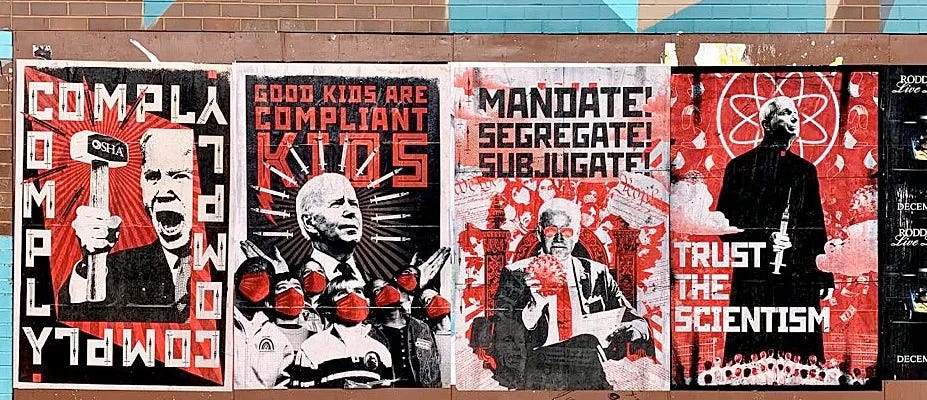The pandemic really was a weird time. Do you remember "Scary Poppins," the all-singing, all-dancing head of the proposed disinformation department? Her mission was to stop people saying wrong things about covid-19 and replace that with government-approved messaging. Well, after a whole lot of backlash, the plan was shelved. (Sort of..) But the fact that the US government wanted to set up a Ministry of Truth revealed that even states in the democratic West are happy to go out of their way to control the flow of information.
The opening of the newly formed Foreign Malign Influence Center however, has largely escaped public notice. Housed in the Office of the Director of National Intelligence, it aims to shield the American public from misinformation beaming from overseas. Its fact sheet claims that the threat to "democratic processes and institutions from foreign malign influence is persistent and dynamic" and requires "constant attention, a whole-of-government approach, support from the private sector, and engagement from the public." Consider yourself recruited.
Ostensibly, State information filtering is justified as being necessary during times of uncertainty, to mitigate against plague or terrorism or natural disaster. But independent journalist Matt Taibbi, who unpicked the Twitter Files, recognizes a pattern here: "It's the basic rhetorical trick of the censorship age: raise a fuss about a foreign threat, using it as a battering ram to get everyone from Congress to the tech companies to submit to increased regulation and surveillance, then, slowly, adjust your aim to domestic targets."
This formula – amending the target after the launch – seems to be too tempting a tool when it comes to government-sponsored propaganda. During the World Wars of the 20th century, the American government joined British and Allied forces in the production of propaganda, spawning Voice of America to counteract enemy messaging abroad. Hollywood was also co-opted for the fight through the government-directed Bureau of Motion Pictures. But as the War ended and the Cold War dawned, lawmakers wanted to ensure that the government could not use propaganda on its own people, passing laws like the Smith-Mundt Act. Yet, the tweaking of that Act in 2012 and projects like Operation Mockingbird provided ways for the US government to skirt around the restrictions, by planting their narrative in overseas channels first for American journalists to conveniently discover. Today, it is easier to set up your own fact checkers.
The wash-up from the pandemic years has revealed that not only were governments willing to weaponize just about anything to take control of public opinion and behavior, but co-operative corporations, Silicon Valley and compliant media created something akin to "fifth generation" warfare. Simple propaganda is out and the psychological-operation is in. Dropping leaflets over enemy territory has morphed into sophisticated campaigns of influence and manipulation. (Indeed, the psychological warfare division of the US military might be the last one with rigorous entry requirements!)
In a Substack post, writer Theophilus Chilton explains that while the aim of propaganda is to embellish the truth, the goal of a "psy-op" is to mask it. Propaganda can get people to conform from fear of being the odd one out, but the aim of a psy-op is to create true believers. Havel's famous green grocer puts the regime's signage in his window because he doesn't want to be punished, how much better for his manipulators if he truly believes the lie?
Governments wanting to nudge their citizens towards a certain viewpoint or behavior is nothing new – maintaining order is the job of good rulers. But if a government feels the need to feed the people propaganda, are citizens considered enemies of the State? At a recent college graduation ceremony, President Biden said that home-grown white supremacy is the "greatest terrorist threat" to America. So for his part, it would seem at least some citizens are fair game.
During the excellent Brief History of Power series on the Cold War (here, here and here), Dr. Koontz noted that governments have a vested interest in keeping a nation on a "permanent war footing." Fear is very good for ensuring a population is un-moored and pliable. So, it helps those who wish to retain power and control that the covid epidemic is giving way to an epidemic of loneliness or racism or crime. The drug crisis is followed by the border crisis, the climate crisis, the housing crisis and on it goes. You might call it "permacrisis". Not that these things aren't real or alarming, but piping it into homes 24/7 results in learned helplessness.
Yes, our governments lie to us. But we don't need to be fearful consumers of messages in the white noise. Author Stella Morabito says that understanding what is going on is half way out of the problem. Refusing to be isolated and striving not to self-censor are weapons against false and destructive messages. Speaking with neighbors, conversations at BBQs, and discussion at bookclub, might be all that is needed to break the spell of the psy-op.
For Christians, time spent in the Bible creates white space between the world's rhetoric and the truth. Renewing our minds with God's words is our first defense against lies, whether they come from the government or elsewhere. Feasting on Christ's supper and communing with the saints is the shelter in the storm. We are sure, as the prophet says, that no weapon formed against Christ's people can prosper. "This is the heritage of the servants of the Lord, and their righteousness is from Me,” says the Lord.
So, "be anxious for nothing, but in everything by prayer and supplication, with thanksgiving, let your requests be made known to God; and the peace of God, which surpasses all understanding, will guard your hearts and minds through Christ Jesus" (Philippians 4: 6-7).





